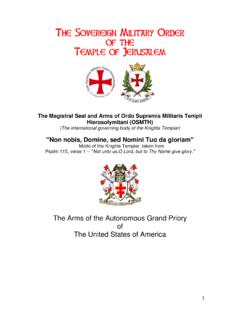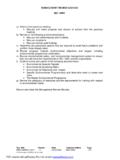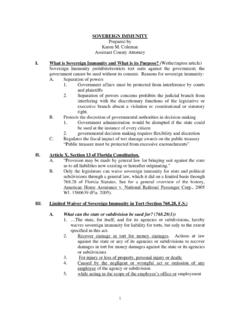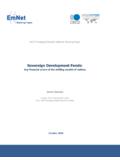Transcription of SOVEREIGN AND CHARITABLE IMMUNITY IN THE …
1 SOVEREIGN AND CHARITABLE IMMUNITY IN THE COMMONWEALTH OF VIRGINIA Jason J. Ham* I. SOVEREIGN IMMUNITY IN VIRGINIA SOVEREIGN IMMUNITY is an ancient rule of law which protects some governmen tal entities and their employees from certain kinds of lawsuits. The SOVEREIGN to which the rule originally referred was the king. Because the king was the source of law, the king could not violate the law. IMMUNITY means "freedom or exemp tion from obligation in any respect."l Therefore, the SOVEREIGN was not only excused from having to pay damages, he was also exempt from any requirement to explain his actions in court. Today the power to make laws is disseminated among federal, state, and local governments and their officials and employees. Because governmental bodies can only act through people, some state employ ees and officials are clothed with SOVEREIGN IMMUNITY . This dissemination of political power has made the law of SOVEREIGN IMMUNITY very complex.
2 SOVEREIGN IMMUNITY provides protection against most suits which are based on tort law. A tort is a violation of a legal duty which results in injury. The most common example of a tort is a car crash in which one person negligently hits another person with his car, injuring the victim and damaging the victim's car. The driver of the car that was hit may sue the other driver in tort for personal injuries and property damage. It is against this type of suit-and others based on tort-that SOVEREIGN IMMUNITY shields governmental bodies and certain of their officials and employees. However, SOVEREIGN IMMUNITY does not protect against an action claiming an infringement of constitutional rights or a breach of contract. Some erudite plaintiffs' attorneys have occasionally been successful in circumventing SOVEREIGN IMMUNITY by disguising their tort claims as contract claims or illegal takings claims which violate constitutional However, in most cases SOVEREIGN IMMUNITY cannot be so easily circumvented.
3 The assertion that the SOVEREIGN can do no wrong has understandably been questioned by many. Some believe that SOVEREIGN IMMUNITY is bad social policy because it often places the cost of an accident upon an innocent individual who * Mr. Ham is with the Harrisonburg firm of Litten & Sipe, , and is a member of the Virginia Association of Defense Attorneys. 1 WEBSTER'S NEW UNIVERSAL UNABRIDGED DrCI'IONARY (Deluxe 2d ed. 1983). 2 Hampton Roads Sanitation Dist. v. McDonnell, 234 Va. 235 (1987); Bums v. Board of Supervisors, 218 Va. 625 (1977); Morris v. Tunnel Dist., 203 Va. 196 (1962). 367 368 JOURNAL OF CIVIL LITIGATION, VOL. X, NO. 4 is less able to absorb the loss than a governmental body. There are several justi fications for the continued existence of SOVEREIGN IMMUNITY , however. Sover eign IMMUNITY protects the public purse and ensures that the state is not "controlled in the use and disposition of the means required for the proper ad ministration of the government.
4 "3 Without SOVEREIGN IMMUNITY there would be a "danger to the public in the form of officials being fearful and unwilling to carry out their public duties" and "public service might be threatened because citizens might be reluctant to take public jobs."4 In short, SOVEREIGN IMMUNITY ensures that the government's operations are not hindered by lawsuits. A. IMMUNITY of the State State governments are immune from suit under the common law and the Eleventh Amendment to the United States In certain situations, plaintiffs have been able to circumvent these rules by suing a state official (such as the governor) who is closely aligned with the state, instead of suing the state directly. This type of suit is very rare, and the only relief available is prospective injunctive relief. For example, the court might require the state official to per form or not to perform some specific act(s), but the court will never require the state official to pay money damages when the money would come from the state government In light of the harsh results that such powerful IMMUNITY would cause, Virginia has elected to partially waive SOVEREIGN IMMUNITY by a statute entitled the Virginia Tort Claims This Act allows plaintiffs who have been injured in tort to sue the Commonwealth of The Act al lows plaintiffs to recover a maximum of $100,000, and other restrictions apply.
5 The Act specifically states that it does not apply to cities, towns, or counties. B. County and School Board IMMUNITY Counties and school boards are political subdivisions of the state and are therefore clothed in the state's SOVEREIGN IMMUNITY . Unless a state statute pro vides otherwise, counties and school boards enjoy IMMUNITY from tort The governmental-proprietary distinction which applies to cities and towns (and which will be discussed later) does not apply to counties or school 3 The Siren, 74 152, 154 (7 Wall.) (1868). 4 Messina v. Burden, 228 Va. 301,307 (1984). 5 CaNST. amend. XI. 6 Ex parte Young, 209 123 (1908); Seminole Tribe of Fla. v. Florida et aI., No. 94-12 (Mar. 27, 1996). 7 VA. CODE , et seq. 8 The Act also allows recovery against certain transportation districts. 9 Mann v. Arlington Co. Bd., 199 Va. 169 (1957); Fry v. Albemarle Co., 86 Va. 195 (1890); Kellam v. School Board, 202 Va. 252 (1960). 10 ld. SOVEREIGN AND CHARITABLE IMMUNITY 369 One significant waiver of this IMMUNITY by state statute is that school boards are not entitled to SOVEREIGN IMMUNITY for accidents involving school busesY C.
6 The IMMUNITY of Other Political Subdivisions of the State Political subdivisions which have been created by the state government, such as the Virginia Department of Highways and Transportation, mental health in stitutions, health departments, and state universities, are always entitled to sov ereign immunityP However, subdivisions of the state which are . reated by ,. ".-:..-" ., cities or towns, such as hospital authorities, park authorities, and redevelopment authorities, are only immune when they perform governmental functions, as will be discussed in the next II. THE IMMUNITY OF CITIES AND TOWNS Cities and towns are immune only when they are engaged in governmental functions, as opposed to proprietary functions. A governmental function is a function which is carried out solely for the public A proprietary func tion, while carried out partially for the public good, is also undertaken in order to be of special benefit to the municipal entity The governmental proprietary distinction is difficult to understand and sometimes results in deci sions which strain reason and logic.
7 Because of the lack of clarity in the underly ing rule, there are over twenty Supreme Court of Virginia cases which decide whether certain functions are governmental or proprietary. Finding lasting rules from all of these cases is difficult. However, almost every recent case quotes language from an early Supreme Court of Virginia case. That case states that the underlying test of whether a function is governmental or proprietary is "whether the act is for the common good of all without the element of special corporate benefit or pecuniary benefit. If it is, there is no liability, if it is not, there may be liability.,,16 In order to understand this test one must realize that cities and towns have two primary functions. The first function is to benefit the residents of the city or town, and the second function is to benefit members of the general public who are not necessarily residents of the municipal corpora tion. When the municipality performs functions that benefit primarily its own residents, it is performing a proprietary function and is not immune.
8 However, 11 VA. CODE 12 Bowers v. Virginia, 225 Va. 245 (1983); Baumgardner v. Southwestern Va. Mental Health Inst., 247 Va. 486 (1994); James v. Jane, 221 Va. 43 (1980); Faculty for Responsible Change v. Visitors of James Madison Univ. 38 Va. CiT. 159 (Rockingham Co. 1995). 13 Stevens v. Hospital Auth. of the City of Petersburg, 42 Va. CiT. 321 (Richmond 1997); Prendergast v. North ern Va. Regional Park Auth., 227 Va. 190 (1984); VEPCO v. Hampton Redevelopment Auth., 217 Va. 30 (1976). 14 Edwards v. City of Portsmouth, 237 Va. 167 (1989); City of Richmond v. Long's Adm'rs, 58 Va. 357 (1867); Fenon v. City of Norfolk, 203 Va. 551 (1962); Hoggard v. City of Richmond, 172 Va. 145 (1939). 15 Id. 16 Hoggard, 172 Va. at 150. 370 JOURNAL OF CIVIL LITIGATION, VOL. X, NO. 4 when the municipality acts in order to further the interests of the public at large, the municipality is clothed with SOVEREIGN IMMUNITY because it is acting as an agent of the state. When viewed with this distinction in mind, some of the cases make more sense, while others still seem somewhat arbitrary.
9 However, two generalities can be gleaned from the numerous cases on SOVEREIGN IMMUNITY . A. Claims of Negligent Planning In general, a city or town is engaged in a governmental function when it plans, designs, and engineers local improvements. The rationale for this is that the' streets are open for the use of all visitors to the municipality and are not primar ily designed to benefit town or city residents. For example, municipalities will generally be immune from a suit which claims that a public street or sidewalk was negligently constructedP A city or town would also be immune from a suit which claimed that the municipality was negligent in its placement or nonplace ment of traffic signals, control devices, or Similarly, the municipality is immune when engaged in the engineering, designing, and planning of water, sewer, and drainage However, there is an exception to this general rule. If a plaintiff can show that a municipality maintained a public nuisance then the city or town would not be o A plaintiff alleging that a street consti tuted a public nuisance must show that the condition imperils the safety of a public highway, that it is dangerous and hazardous in itself, and that the munici pality had notice of the A plaintiff alleging that a municipality created a nuisance must also show either that the "condition claimed to be a nuisance was not authorized by law or the act creating or maintaining the nuisance was negligently performed.
10 ,,22 B. Claims of Negligent Maintenance The second generality that can be gleaned from the substantial case law is that, in general, municipalities are not immune from suits which allege that the municipality negligently maintained a sewer, street, or other municipal prop The rationale for this rule is that while the maintenance of municipal property benefits the public at large, it primarily benefits the residents of the city or town and is therefore a proprietary function. In order to recover on a claim of negligent maintenance, however, the plaintiff must prove that the mu-17 City of Norfolk v. Hall, 175 Va. 545 (1940); Jones v. Williamsburg, 97 Va. 722 (1900); Evans v. City of Richmond, 33 Va. Cir. 93 (Richmond 1993). 18 Freeman v. City of Norfolk, 221 Va. 257 (1980). 19 Hall, 175 Va. 545; Wilshin v. City of Fredericksburg, 26 Va. Cir. 329 (Fredericksburg 1992). 20 Taylor v. City of Charlottesville, 240 Va. 367 (1990); Chapman v. City of Va. Beach, 252 Va.







